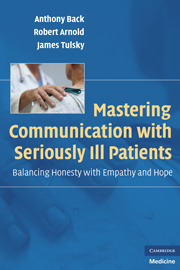Book contents
- Frontmatter
- Contents
- PREFACE
- 1 TAKING YOUR SKILLS TO THE NEXT LEVEL
- 2 GETTING A GOOD START
- 3 TALKING ABOUT SERIOUS NEWS
- 4 DISCUSSING EVIDENCE FOR MAKING TREATMENT DECISIONS
- 5 DISCUSSING PROGNOSIS
- 6 BETWEEN THE BIG EVENTS
- 7 CONDUCTING A FAMILY CONFERENCE
- 8 DEALING WITH CONFLICTS
- 9 TRANSITIONS TO END-OF-LIFE CARE
- 10 TALKING ABOUT DYING
- 11 CULTIVATING YOUR SKILLS
- APPENDIX A THE ROADMAPS IN OUTLINE FORM
- APPENDIX B ACKNOWLEDGMENTS
- INDEX
8 - DEALING WITH CONFLICTS
From “Who's right?” to “What are our shared interests?”
Published online by Cambridge University Press: 23 November 2009
- Frontmatter
- Contents
- PREFACE
- 1 TAKING YOUR SKILLS TO THE NEXT LEVEL
- 2 GETTING A GOOD START
- 3 TALKING ABOUT SERIOUS NEWS
- 4 DISCUSSING EVIDENCE FOR MAKING TREATMENT DECISIONS
- 5 DISCUSSING PROGNOSIS
- 6 BETWEEN THE BIG EVENTS
- 7 CONDUCTING A FAMILY CONFERENCE
- 8 DEALING WITH CONFLICTS
- 9 TRANSITIONS TO END-OF-LIFE CARE
- 10 TALKING ABOUT DYING
- 11 CULTIVATING YOUR SKILLS
- APPENDIX A THE ROADMAPS IN OUTLINE FORM
- APPENDIX B ACKNOWLEDGMENTS
- INDEX
Summary
Looking for value in differing points of view
Up to this point, we have talked about communication meant to educate, support, and empower patients, with the underlying assumption that beneath it all, the clinician and patient can agree on the next step. But what do we do when physician and patient don't agree? Consider the patient with metastatic colon cancer progressing despite fourth-line chemotherapy who wants you to give another regimen that you think will be a waste of time. Or the ICU team who wanted to give up on someone you thought still had a chance.
These are uncomfortable situations for most physicians. The term “conflict” may be overkill for many disagreements but physicians often back off at the smallest signal of conflict. Most of us just don't like to argue. Often we assume that disagreement means that our expertise is being called into question, and that makes us react either by saying, “I can't do that” or by withdrawing and deferring to “whatever the patient wants.” Neither of these two reactions allows us to discuss our differences of opinion, explore the options, and come up with an agreement that we all could live with.
How do better communication skills help address a conflict? They do so by shifting the focus from “who's winning?” to “what's at stake for the patient”.
- Type
- Chapter
- Information
- Mastering Communication with Seriously Ill PatientsBalancing Honesty with Empathy and Hope, pp. 93 - 106Publisher: Cambridge University PressPrint publication year: 2009
- 1
- Cited by

